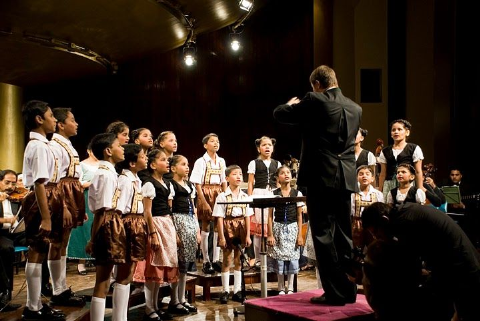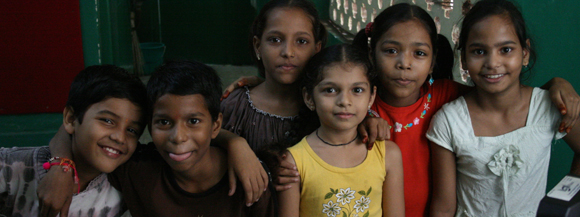 For the first time in the history of The National Theatre of the Performing Arts, the elite and prestigious institution has moved to combine kids from the slums of Mumbai, India with the Bombay Chamber Orchestra to perform “The Sound of Music,” a Rodgers & Hammerstein musical.
For the first time in the history of The National Theatre of the Performing Arts, the elite and prestigious institution has moved to combine kids from the slums of Mumbai, India with the Bombay Chamber Orchestra to perform “The Sound of Music,” a Rodgers & Hammerstein musical.
The Sound of Mumbai: A Musical, directed by Australian-born Sarah McCarthy is a feature documentary which follows the rehearsals and a one-night only performance of the slum kids singing timeless favorites like Do, Re, Mi and My Favorite Things.
With over $100,000 in debt with The Sound of Mumbai: A Musical, and no interest for over six months, Sarah McCarthy wondered what was the purpose of doing the film. Until finally it was picked up for the Toronto Film Festival, and later by HBO. Now McCarthy is committed to two years of promoting her new documentary with a special screening in Miami during the Miami International Film Festival and at the Carnegie Hall in New York.
Projected three-stories-high on the wall of the New World Symphony’s Frank Gehry-designed campus in Miami Beach, residents and visitors to the city of Miami were treated to a free screening of The Sound of Mumbai: A Musical. It was only fitting to feature the documentary at the newly designed New World Center building as it shares parallels with the film. It serves as a platform for bridging the divide in classical music by bringing classical music to everyone in the city of Miami. An experience that would not normally be available to everyone.
When McCarthy was initially approached to do a film about an Orchestra in India, she showed no interest. After learning of a unique and rare collaboration where Indian street kids were being recruited to perform a one-time-only concert with members of the prestigious Bombay Chamber Orchestra, her interest peaked.
In the documentary, McCarthy followed and documented the journey of the young aspirants as they rehearsed and performed for a life changing opportunity. An opportunity that would not have been available to citizens within the lower social and economical spheres.
In my conversation with, Sarah McCarthy, she talks about her relationship with the children, her new project which was inspired by the connections she formed while filming The Sounds of Mumbai: A Musical.

Are you excited about showing at the Miami International Film Festival and at the New World Center?
I grew up on the beach and living in London now I never get the chance to go to the beach and I miss it desperately. So I am excited to be in Miami Beach. I am looking at the New World Center building from my hotel room and it looks incredible.I did not realize how big the screen actually was-it is enormous. It is really nice for a center that is aimed at bringing classical music to the whole city of Miami people who might not necessarily go to something like that; is showing a film that is about choir kids from the slums of Mumbai who would not normally get to perform in such a prestigious event or venue.
Since the Slumdog Millionaire many directors, and film makers have turned to India for inspiration. Why have you decided to turn to India for your creative inspiration?
My producer, Joe Walters who plays the French horn for the Bombay Chamber Orchestra, he wanted me to do the film for a very long time about the orchestra and I thought that it was absolutely boring. He was very persistent and in one of his emails, it was about the choir children from the slums and they were putting on a concert for The Sounds of Music and then my interest was peaked. There was a lot of appetite for Indian stories in the wake of The Slumdog Millionaire. I was just lucky to have such a wonderful story to fall into my lap.
What was the most important lesson you learned from doing this film with the children?
The most important lesson I have learned personally was that we are never allowed to whine about anything ever. These kids who have so little, they are totally optimistic and determined and they have this incredible sense of optimism and possibility and they have virtually nothing. I think there is a lot that everyone who is privileged can learn from that. I am interested in using the films that I make to help the people that are in it. We are in the process of raising funds for the kids and for the school, and embedding the film in existing campaigns to improve the quality of education in India. That has been the most rewarding part for me, seeing my film doing some real good just using it as a fundraising tool and we are doing really well. We just received a huge grant and that was apart of the pitch. And we are holding fundraising programs in London and HBO will be doing a couple in the U.S. Once we have raised enough money we will go back to India then we will figure out with the school and with the parents how best to use the money that we have raised to help the kids.
Do you get the feeling that there is a deep desire for these kids to create an escape from their current situations?
Yes, definitely. A lot of people think that the films they see about India are based on the idea that they are poor but they are happy. That is true in some ways but I don’t think they are content with what they have. I think they are happy because they are clever enough to realize that positivity is really important part in getting out of the slums. You have to remain positive, hard working and diligent, if you ever want a shot at getting out. The slums are a really dark and dangerous places, there is real pressure, especially on Ashish(the main character in the film) to pull his family out of those situations. It is so hard when they don’t have access to decent education, they don’t have quiet places to study, they don’t have routine and discipline in which to study, it is really difficult for them.
You were well received at the Toronto Film Festival, did you imagine that you would receive the positive feedback you have received so far?
When you make a film there is always a strange period where you have made it and you wonder what will happen with it, and you ship it out to the festivals to see what happens. Then nothing happens for ages, then out of the blue, Tom Powers program in Toronto picked it up and puts it into his program. From there everything just exploded, and for 6 months nothing was happening then I started to question what was the purpose for that. I was $100,000 in debt with a film that no one really cares about, what now? Then Tom Powers came forward, HBO got involved, now it will be showed in Carnegie Hall in New York City, New World Center in Miami. So it is incredibly exciting.
So are you enjoying the success?
Yes, it is really nice. It feels quite dangerous in a way, especially now it is all about the film, you get to travel around the world talking about the film for the next 2 years. I have another project kicking off that really requires my focus and attention and it is really distracting running around in places like Miami because there is just so much to be had.

So, what are you currently working on?
The next film I am working on is called The Dark Matter of Love. It came from the idea just hanging out with Ashish and his friends in India. I was just struck by how competent, determined and together they were when they did not have enough to eat, literally dire situations, and they were so emotionally capable and they can make friends quickly. I think the reason they were like that because they have tight-knit family units. And so when I got back I started looking into stories where you could have a safe place to live, enough to eat but maybe didn’t have a deep family affection or bonds in early life. Then I started digging around in science on mother-child-love and how much of an effect your relationship with your mother early in your life have on the kind of person you have become. It is a really fascinating area. The next film is about a family in the U.S. who are about to adopt a 6 year old girl and an 8 year old boy from Russia and they grow up in an institution and never learned how to be a part of a family. I will follow those stories as I have learned how to deal with having your own room and not living in a dormitory, how to deal with having access to a big fridge filled with American food all the time, being tucked in and being kissed good night and having a birthday party because they have never had a birthday party before. I will follow that story for over 12 months. I hope by the end, they will learn what I think is one of the most important lessons that human beings can learn, how to love and how to be a part of a family. I hope to link that story to the history of the evolution of mother-child-love(the science of ), which is pretty fascinating.
In the film, there is a mirror that Ashish looks into to reassure himself, what does this symbolizes for Ashish?
“I am not self conscious, I am confident in me, I can do everything.” One of the teachers taught him that, a sort of Western self help–affirmation. It is fascinating to me that people in the slums of India would be doing that kind of thing. I think it is a way for Ashish to remind himself that he does have confidence and he does have strength, and he can do the things he wants to do if only he believes in himself. He is clever enough to be aware that his situation is pretty dire and the opportunities available to him are pretty limited. So he really has to rally himself to stay focus on his work, but he is doing really well. He received 100% on his mathematics exam and he is studying for a scholarship exam to get him into college.
Do you still stay in contact with the children?
I am mainly in contact with Ashish and his best friend. It is possible that they might come out for the screening at Carnegie Hall in New York City. I have spoken with lots of charities in London who work in India as well to meet with the children at school.
What are your hopes for this film, The Sound of Mumbai?
What do I really hope that my film can help the kids change their lives. I don’t want to be too ambitious with this kind of stuff but cautiously ambitious for holding a series of screenings in Mumbai for the very rich and influential, education ministries, policy makers, to try and at least open the conversation about the level of education available to kids from the slums. It is totally horrific.It is just not fair. They deserve a good school. They are bright, hard working and desperate and all they need is a descent system to mold their minds around and they could do whatever they wanted. I hope I can set my film in place in order to help with this.
_Daedrian McNaughton